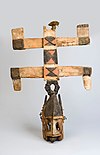Juju
| Part of a series on |
| Traditional African religions |
|---|
 |
|
Juju or ju-ju (French: joujou, lit. 'plaything')[1][2] is a spiritual belief system incorporating objects, such as amulets, and spells used in religious practice in West Africa, especially[citation needed] the people of Ghana, Nigeria and Cameroon.[3] The term has been applied to traditional African religions.[4]
In a general sense the term "juju" can be used to refer to magical properties dealing with good luck.[5]
History[]

The term "juju" appeared in connection with the Priest-Kings of towns in West Africa, upon whom the prosperity of towns was believed to depend.[6] This is recorded by Sir James George Frazer in Folk-Lore (Vol. XXVI.) He prints, under the title A Priest-King in Nigeria, a communication received from Mr. P. A. Talbot, District Commissioner in S. Nigeria. The writer states that the dominant Ju-Ju of Elele, a town in the N.W. of the Degema district, is a Priest-King, elected for a term of seven years. "The whole prosperity of the town, especially the fruitfulness of farm, byre, and marriage-bed, was linked with his life. Should he fall sick, it entailed family of gana and grave disaster upon the inhabitants."[7]
Practices[]
Juju is a folk magic in West Africa; within juju a variety of concepts exist. Juju charms and spells can be used to inflict either bad or good juju, which equate to either bad or good luck.[citation needed] Juju charms can at times employ Arabic texts written by Islamic religious leaders.[8] A "juju man" is any man vetted by local traditions and well versed in traditional spiritual medicines.[9]
Juju is sometimes used to enforce a contract or ensure compliance. In a typical scenario, the witch doctor casting the spell requires payment for this service.[10]
References[]
- ^ "Juju | Define Juju at Dictionary.com". Dictionary.reference.com. Retrieved 2013-07-05.
- ^ Harper, Douglas. "juju". Online Etymology Dictionary.
- ^ "Nigeria under the spell of juju". Latest Nigeria News, Nigerian Newspapers, Politics. 2020-01-13. Retrieved 2020-03-05.
- ^ (1898). "Religion and Missionaries". Imperial Africa: The Rise, Progress and Future of the British Possessions in Africa. Imperial Press. p. 392.
- ^ Afro-Caribbean Religions: An Introduction to Their Historical, Cultural, and Sacred Traditions. Temple University Press. 2010. ISBN 9781439901755.
- ^ TALBOT, P. AMAURY (April 1925). "Some Foreign Influences on Nigeria". African Affairs. XXIV (XCV): 178–201. doi:10.1093/oxfordjournals.afraf.a100130. ISSN 1468-2621.
- ^ From Ritual To Romance, Jessie L. Weston https://www.gutenberg.org/cache/epub/4090/pg4090-images.html
- ^ Smith, H. E. (1929). "Magic and Spells on the Gold Coast". The Police Journal: Theory, Practice and Principles. Gold Coast Police. 2 (2): 316–321. doi:10.1177/0032258x2900200212. S2CID 148990891.
- ^ Bever, Bep Oliver (1983). "The West African Juju Man and the Tools of his Trade". The International Journal of Crude Drug Research. 21 (3): 97–120. doi:10.3109/13880208309070623.
- ^ "People & Power - The Nigerian Connection". Al Jazeera. 11 June 2012.
- Traditional African religions
- Amulets
- Incantation
- African witchcraft
- Magic (supernatural)